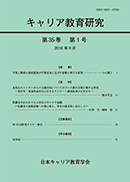A support from parent is thought to be important in career decision-making among Japanese high school students. The purpose of this study was to investigate the relationships among supports from parent, career decision-making self-efficacy and career decision-making behavior. Students(first and second years of high school students)completed a questionnaire measuring supports from parent, career decision-making self-efficacy, and career decision-making behavior. The support from parent was measured by the Career-Related Parent Support Scale(Turner et al., 2003). For the Career-Related Parent Support Scale, factor analysis yielded 2 subscales: encouragement and expectation, provision of information on occupational experience of the parent. The results showed that provision of information on occupational experience of the parent scores of female students were higher than that of male students. And, the result showed that a direct relationship of encouragement and expectation and career decision-making self-efficacy. But a direct relationship of all supports and career decision-making behavior did not show.
View full abstract
